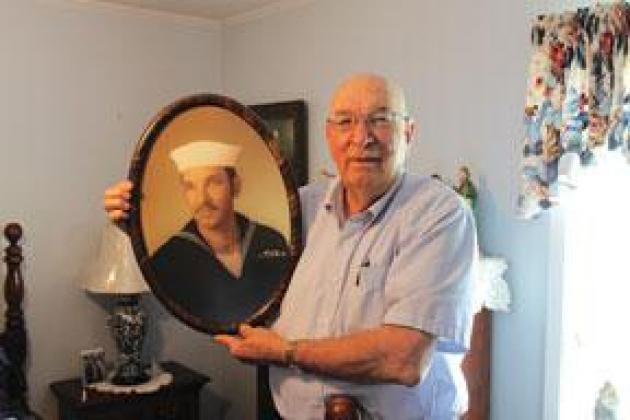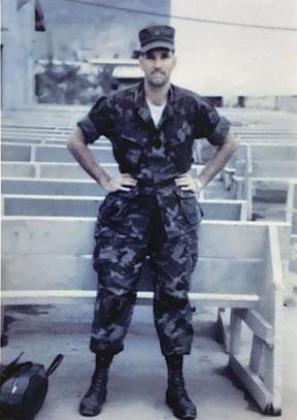

Tony Marks/Ville Platte Gazette
As Americans we are called to give of ourselves and to help our fellow countrymen when they are in need. One Ville Platte native has exemplified this idea from serving in the jungles of Vietnam to serving the Lamb of God as a naval chaplain.
This year marks the 50th Commemoration of the Vietnam War, and the Rev. Richard Vidrine recently reflected on his year spent in Vietnam
He was trained to be a med tech before joining the Navy. “I had a matter of weeks to be drafted, so I joined the Navy,” he said. “I started off in boot camp in San Diego, and from there I went to Camp Del Mar which was at Pendleton for training.”
After his training Vidrine was sent with his 2nd Battalion 7th Marines to the jungles of Vietnam where he served from 1969 to the beginning of 1970. “I wanted to be in the Med Corps,” he said. “I always loved the medical field, and I loved everything about medicine, and I love helping people which I’ve done all my life.”
“When I started at the Delac Pass, I went into the lab working general corpsman duties as well as giving out medication, sewing up people, and starting IVs,” he explained. “My main function was as soon as I got there was to put together a small lab. Being that I could do all of these lab tests myself, I saved all of these man hours of sending the soldiers to the hospital.”
“I sent patients to the hospital as need be for certain things that I couldn’t do or that was too complicated for what we had,” he continued. “If it was some simple breaks, then we could set it and put it back together ourselves.”
Vidrine was then transferred with his battalion to LZ Ross which was an area that was heavily infiltrated by the North Vietnamese and the Viet Cong. “We were shelled or rocketed everyday,” he said. “We could hear them coming. We knew about the times they would come, so we would take cover.”
Enemy shells and rockets were not the only things that made life difficult. As Vidrine explained water was a problem as well. “We didn’t have much place to bathe, but there was an old pond where the buffalo used to come in and drink,” he said. “We’d go in there and splash off with water to clean up as best as we could. Then they finally got a well drilled, so we’d take ice cold showers. It felt good after working in the hot weather.”
Vidrine and his battalion was sent from LZ Ross to different valleys to intercept the enemy. “One place was Hiep Duc Valley which became known an Death Valley,” he explained. “The group of Marines that I was with had over 200 that were killed and/or wounded in two days and a night.”
While returning from there to base camp to get resupplied, Vidrine had an encounter that changed the course of the war for him. “We were marching late in the afternoon when it had been pouring down rain,” he said. “The Marines had me in the middle of a column where they usually put the doctor. The grass began to give way gradually on the very small levee of the rice paddy.”
“When I fell all the weight shifted that I had on my back,” he continued to explain. “My foot went down into the mud, and I broke my ankle. I put the ankle back into place and reduced the fracture. Then I had to continue marching because we were in an open field, and we were sitting ducks for mortars and rockets.”
The next morning Vidrine was taken by helicopter from the dry rice field, where he had spent the night, to the hospital where he developed a bad infection in his right index finger. He described what he went through next when the doctors had to do surgery on his finger. “They opened it up, and they gave me no anesthesia because there was anesthesia only for the very severe cases. They did surgery on my finger cold turkey. One corpsman held down my hand, one laid across my chest, and I had to hold onto the gurney with my left hand.”
“The doctor was working on my hand cutting and opening the wound where it was infected, and my legs would go up and down. I was bathed in sweat from the pain, and the puss was just dripping on the floor. I had an infected hand on a pillow on the right, and I had a broken ankle on the left on another pillow. They then started giving me IVs and shots because I had such a high fever from the infection.”
After spending 21 days in the hospital, Vidrine spent his final four months in Vietnam working in the surgery and debridement clinic. “We were a group of corpsmen working in there that they thought were qualified to do minor surgery and to debride all of the wounds that came in that were not in the body cavity itself,” he said. “We had the equivalency at that point to be LPN nurses, but we would do everything ourselves. We’d write up all the charts, and the doctor would sign every chart. We were responsible for the patients as they would go into the ward.”
Upon completion of his year of service in Vietnam, Vidrine returned home to Ville Platte and began working as a med tech at St. Francis Cabrini Hospital in Alexandria where he worked for 14 and a half years. He was called up the Naval Reserves at the outbreak of Operation Desert Shield/Desert Storm. He was sent to Bethesda Naval Hospital in Maryland where he worked in the blood bank for three months before being allowed to return home. As he stated, “I returned to my work at Cabrini, but after 14 and a half years there God let me know it was time to go to the seminary.”
He had joined the seminary previously while first working at Cabrini, but he got out for a while. After rejoining the seminary, he graduated with two masters’ degrees and was ordained a priest. Vidrine spent a year at a parish in Church Point before the Archbishop for Military Services called him back to military service.
“I started my career as a chaplain in the military back with the Marines in Okinawa which was always a joy because the Marines are a great bunch of people,” he said.
Upon leaving Okinawa, Vidrine spent time as a chaplain on six different Naval ships before heading the Catholic program at the base in Newport, R. I. He spent the remainder of his time as a chaplain at Belle Chasse Naval Air Station.
“I was there before Katrina, and then I helped the base to recover and to get the base going again,” he said. “I oversaw the building and design of a new chapel for the base. I guess you could say that was the crowning jewel of all of my years of service was to build a new chapel and have it all supplied and ready to function as a chapel for Catholics, Protestants, Jews, or whatever faith group wished to worship there.”
Father Richard, as he is commonly known, is now retired from the military and the priesthood. He still assists local churches in saying Mass whenever needed. He talked about how serving as a medical corpsman in Vietnam correlated to serving as a chaplain. “It helped me to be a much better chaplain,” he said. “It helped me to be more understanding of the wounds people carry so often that you don’t see immediately. The way people act sometimes is not necessarily the way they are because of what they’ve been through.”
“You come to understand that’s the way they are, and then you help them where they are to grow and get the proper help that they need to become the people they need to be or to get over their hidden wounds,” he added. “A lot of times people carry a lot of hidden wounds. It’s always a Chaplain’s duty and job to help the people to be the best they can be not only for themselves but for their God, for their fellow man, and for our Country.”
